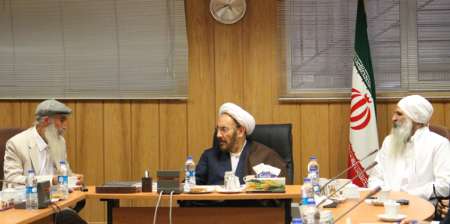'It is true that in the Constitution of the Islamic Republic of Iran there is no mention of your ancient religion, but I believe there is no obstacle in the way of adding your monotheist religion as an official Iranian faith side by side with other divine faiths as an appendix to the Constitution,' said Hojjatoleslam Ali Yunesi.
He said that reliable sources and jurisprudence surveys have showed that the Sabaeans have a Divine Book and a true Prophet, which is why their religion is among other authentic faiths.
'There is no legal obstacle in the way of recognition of the Sabaeans' faith as an official Iranian religion, since the Shi'a jurisprudence has not restricted the People of the Books to certain religions, but has defined their characteristics, which is inclusive of the Sabaeans' religion,' he said.
The president's special assistant for ethnic minorities affairs addressing the members of the Mandaean Sabaeans Association of Iran emphasized that they had not thus far spent sufficient efforts aimed at introducing their true religion to the Iranian society.
'Spend greater efforts in that way. Our Holy Book has in several verses referred to the Sabaeans as a Divine religion. The Shi'a and the Shafeie religions have separately spoken of the authenticity of your faith, but whether the Sabaeans referred to in Qur'an is you respected Mandaeans, there is no precise insight,' he said.
Hojjatoleslam Yunesi also said that the Mnadaeans are all the same Iranians and the citizens of this ancient land and that the Supreme Leader's decree has approved of their faith, which is why they are considered as the Peoples of the Book.
'The government is responsible for solving your problem and we will pursue the matter and inform you' said Yunesi.
The Leader of the Iranian Mandaean Sabaeans Eminence Genzura Najah in the beginning of the meeting dully appreciated the president's assistance for giving them a chance to meet him and peak about their problems.
'We consider you as a sympathetic friend,' he added.
The religious leader of the ancient faith said that his followers feel that during President Hassan Rouhani's tenure the government cares about the Mnadaens and their problems.
'This is very precious and of great significance for us,' he added.
Also the head of the Mandaean Sabaeans Association of Iran Professor Salem Chehili appreciated Yunesi for receiving them, arguing that registration of the Mandaeans' youth in the universities, informing the schools in Khuzestan province that enrolment of the Mandaeans' children is legally approved and nomination of the Mandaeans' babies by their own religious names are among the greatest achievements for them up to now.
He added that today employment is the greatest remaining problem for the Iranian Mandaeans, which he hoped will be resolved thanks to the Prudence and Hope Government's good will and sympathetic feelings.
There are no authentic national consensus on the population of the Mandaean Sabaeans, who live in Iran's southwestern Khuzestan province but their population is estimated to be between 7 to 20 thousand and they mainly live in the provincial capital city, Ahvaz.
The Sabaeans or Sabeans were an ancient people speaking an Old South Arabian language who lived in what is today Yemen, in the south west of the Arabian Peninsula.
Sabeans inhabited the Biblical land of Sheba, a trading state that flourished for over a thousand years in modern-day Yemen.
Modern archaeological studies support the view that the biblical kingdom of Sheba was the ancient Semitic civilization of Sabaeans in Yemen, between 1200 BCE until 275 CE with its capital Marib.
Their kingdom fell after a long but sporadic civil war between several Yemeni dynasties claiming kingship, resulting in the rise of the late Himyarite Kingdom. Sabaeans are mentioned in the biblical books of Job, Joel, Ezekiel, and Isaiah, and in verses 2:62, 5:69, and 22:17 of the Qur'an.
Mandaeans are an ethnoreligious group indigenous to the alluvial plain of southern Mesopotamia and are followers of Mandaeism, a Gnostic religion. The Mandaeans were originally native speakers of Mandaic, a Semitic language that evolved from Eastern Middle Aramaic, before many switched to colloquial Iraqi Arabic and Modern Persian.
Mandaic is mainly preserved as a liturgical language. During the century's first decade the indigenous Mandaic community of Iraq, which used to number 60–70,000 persons, collapsed in the aftermath of the Iraq War of 2003; most of the community relocated to nearby Iran, Syria and Jordan, or formed Diaspora communities beyond the Middle East. The other indigenous community of Iranian Mandaeans has also been dwindling as a result of religious persecution over that decade.
2329**1377

Tehran, Dec 25, IRNA – President's special assistant said in a meeting with the leader and member of Mandaean Sabaeans Association of Iran that Supreme Leader's historical decree paved the path for recognition of ancient, monotheist Sabaeans' faith as an official Iranian religion.

